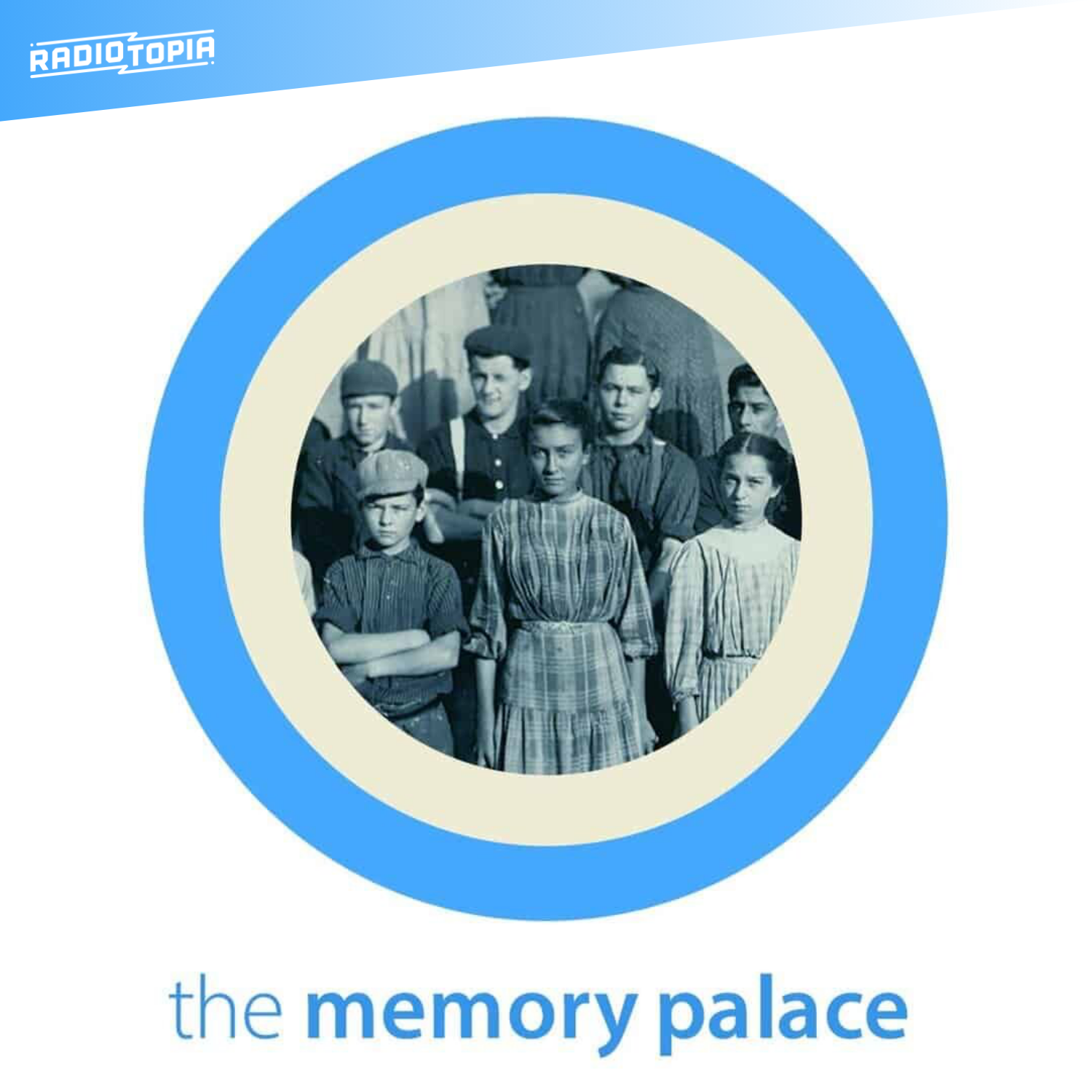Episode 133: Antidisestablishmentarianism
Order The Memory Palace book now, dear listener. On Bookshop.org, on Amazon.com, on Barnes & Noble, or directly from Random House. Or order the audiobook at places like Libro.fm.
The Memory Palace is a proud member of Radiotopia from PRX. Radiotopia is a collective of independently owned and operated podcasts that’s a part of PRX, a not-for-profit public media company. If you’d like to directly support this show, you can make a donation at Radiotopia.fm/donate.
This episode was originally released in October of 2018.
Music
- We start with the very English, Voluntary No. 4 in b-flat Minor, by Margaret Phillips.
- Hear Nero’s Nocturne from Chilly Gonzales.
- Some of The Stars vs. Creatures by Colleen.
Abide with Me from the Thelonious Monk Septet off his Monk’s Music album.
Walzer fur Robert by Anne Muller off of Erased Tapes Volume 5.
Evening at Eight by Keith Kenniff.- and Berceuse by Alexandra Streliski.
Learn about your ad choices: dovetail.prx.org/ad-choices
Press play and read along
Transcript
Speaker 1 This episode of the Memory Palace is brought to you by our friends at Quince.
Speaker 1 Cooler temperatures are on the way, and as always, Quince is where I am turning for fall staples that actually last from cashmere to denim to boots.
Speaker 1
The quality holds up and the price still blows me away. And the holding up to me, that is really the thing.
Last year I got one of their super soft, 100% Mongolian cashmere sweaters.
Speaker 1
This beautiful and classic brown. 60 bucks, though it looked like a proverbial million.
And I know that that sweater, it's just waiting for me, waiting for those cooler temperatures.
Speaker 1
And when I take it out of the drawer, it is still going to look great. It is still going to feel great.
It's still going to be in fashion because Quince specializes in true classic staples.
Speaker 1 If you want denim that's durable, leather jackets with that clean classic look, you don't want the crazy markups that other retailers are trying to foist on you.
Speaker 1 And you want to know that that classic look, it's going to be in fashion for a long time to come. What you're going to want to wear forever is still going to be wearable for a long time to come.
Speaker 1
Look no further than Quince. Keep it classic and cool this fall with long-lasting staples from Quince.
Go to quince.com slash memory for free shipping on your order and 365-day returns.
Speaker 1 That's Q-U-I-N-C-E.com slash memory. Free shipping in 365-day returns, quince.com slash memory.
Speaker 1
This episode of Memory Palace is brought to you by Progressive Insurance. You chose to hit play on this podcast today.
Smart Choice.
Speaker 1 Make another smart choice with AutoQuote Explorer to compare rates from multiple car insurance companies all at once. Try it at progressive.com.
Speaker 1 Progressive Casualty Insurance Company and affiliates, not available in all states or situations. Prices vary based on how you buy.
Speaker 1 This is the Memory Palace. I'm Nate DeMayo.
Speaker 1 There is a word in English that is still alive that is spoken ever, merely because it is long.
Speaker 1 Anti-disestablishmentarianism is the longest word in the English language that isn't a scientific term or wasn't coined merely in an attempt to make a longer one.
Speaker 1 And it is a very English word, rooted in very English politics to describe the factional opposition to those who, in the 19th century, sought to strip the Anglican Church's status as the State Church of England, Ireland, and Wales, an obscure struggle for power settled long ago.
Speaker 1 It is a word that would have been relegated with little lament to brief mentions in brief passages in very English theses gathering dust in very English libraries were it not ripe for rolling out as a fun fact or issuing as a spelling challenge.
Speaker 1 But despite its length, 12 syllables, two more letters than the English alphabet itself, it's not that hard to spell. You just can't be afraid of it.
Speaker 1 Just need to trust your knowledge of the rules of English pronunciation and stay focused so you can keep your place and not lose your head as you work your way through.
Speaker 1 building the word letter by letter by letter.
Speaker 1 But that itself can be hard, especially especially if you are standing in front of your classroom or on some spelling-beast stage, maybe a number on a placard on a piece of yarn strung around your neck.
Speaker 1 Or if you are Gloria Lockerman,
Speaker 1 12 years old, a student at Booker T. Washington Middle School in a struggling part of West Baltimore, wearing a pale yellow dress.
Speaker 1 Not that people could tell on their black and white televisions, though they could tell she was African-American.
Speaker 1 as she appeared on the $64,000 Question, the most watched show in America there in 1955.
Speaker 1 Less than a year after Brown versus the Board of Education, less than a year before Rosa Parks would be arrested.
Speaker 1 And the show's host, a blandly handsome white man named Hal March,
Speaker 1 says, for $8,000,
Speaker 1 spell anti-disestablishmentarianism.
Speaker 1 Gloria Lockerman got it right, and it blew people's minds.
Speaker 1 That next morning, a Wednesday morning more than 60 years ago, on schoolyards and in stenum pools, at lunch counters still segregated, on buses still segregated.
Speaker 1 That next morning it seemed that all people could talk about was how this 12-year-old black girl, this colored girl, this Negro, and worse, could spell a word almost no one watching that night had ever heard of.
Speaker 1 This whole thing was unheard of. A girl like that.
Speaker 1 It was confounding, infuriating, inspiring, all of it. It was 1955.
Speaker 1 At the heart of the show was a gamble.
Speaker 1
Answer a question right and you double your money. Get it wrong, you lose it all.
So at each step on the way to the $64,000 question, the real question was this.
Speaker 1 Do you bet on yourself? Or do you walk away?
Speaker 1 And how do you bet on yourself? When you are 12 years old, when you have already won $8,000, when your family has never had anything like $8,000 before.
Speaker 1 When you're a smart kid, when your family always said so, when your teachers always said so, said you should go to college.
Speaker 1 But a year at college could cost hundreds of dollars, and where was your family supposed to dig up hundreds of dollars?
Speaker 1 When suddenly you're sitting on $8,000, and your mom and dad are sitting in the audience.
Speaker 1 Rarely together since their divorce, rarely around since they sent you to Baltimore to live with your grandparents.
Speaker 1 And there they are sitting side by side in their Sunday best, nervous as I'll get out on national television.
Speaker 1 While you are in the Revlon isolation booth, with adult-sized headphones on your kid-sized head, smushing down your curls.
Speaker 1 While you wait for the voice of Hal March to tell you which word will decide whether you have $16,000, $16,000, in 1955, or whether you go back to having something like nothing.
Speaker 1 Go back to probably not going to college, even though you know you're smart. When millions of people are watching you.
Speaker 1 And millions of those, millions, are watching just to see you fail.
Speaker 1 There is no surviving footage of what happens next, and no audio for me to play for you wherever you are right now.
Speaker 1 And maybe that's for the best.
Speaker 1 Maybe it should just be silent. After all, the Revlon isolation booth was designed to be silent as you awaited the host's disembodied voice.
Speaker 1 So, spell
Speaker 1 the belligerent, astigmatic anthropologist, annihilated innumerable chrysanthemums.
Speaker 1 I'll wait.
Speaker 1 The next week, a journalist tagged along with Gloria Lockerman, her grandmother, and her English teacher, as they traveled to New York for her next TV appearance in which she would lay her $16,000 in the line for a chance at 32.
Speaker 1 Few people in the memory of this reporter, the man wrote, have ever so completely charmed this blase city in such a short time as did this 12-year-old spelling wizard.
Speaker 1 He goes on to describe scenes of improbable triumph, of a kid from West Baltimore taking Manhattan, Gloria Lockerman at cocktail parties at French restaurants thrown in her honor, surrounded by fans in Harlem, signing dictionaries in a bustling bookstore, getting a kiss on the hand by the dashing Italian star Broadway's South Pacific, being laden with boxes of blouses and dresses, an alpaca coat, gifts from merchants up and down Fifth Avenue.
Speaker 1 But when it came time for the show, Gloria Lockerman didn't go for the $32,000.
Speaker 1
And what a brave thing. For a 12-year-old black girl from Baltimore to go on television.
When millions upon millions have tuned in to watch her go for $32,000.
Speaker 1 When uncountable millions of those are rooting for her. Uncountable girls who look something like her.
Speaker 1 Uncountable grandparents who never thought they'd lived to see the day when someone like Gloria Lockerman would be doing something at all like this.
Speaker 1 And while millions of others are rooting for her to fail or be revealed as the cheat they were sure she must be, some surely wishing her dead. It's 1955.
Speaker 1 It was a brave thing for Gloria Lockerman to walk away.
Speaker 1 Let's not lose sight of that. Gloria Lockerman's family certainly didn't.
Speaker 1 It's 1955.
Speaker 1 You take the money.
Speaker 1 In a country where families like yours have something like nothing, where a daughter like yours is so gifted yet has no guarantee of affording college or finding a use for those gifts, you take the money.
Speaker 1 In a city where homes, whole blocks, playgrounds, and parks just a few blocks north of where Gloria Lockerman lived were torn down to put up a highway.
Speaker 1
Where a few blocks east, east, they were torn down to put up new housing projects. We're federal and local statutes and zoning ordinances.
Power struggles settled long before.
Speaker 1 Made home ownership harder for black Americans, made schools worse, made it harder to build and sustain and pass down the kind of wealth that allows people to claim a place in this world worthy of your gifted daughter.
Speaker 1 You take the money.
Speaker 1 In the months following her appearance on the $64,000 question,
Speaker 1 there in the middle of the 1950s, on the cusp of the civil rights movement, 12-year-old Gloria Lockerman appeared at state fairs, spelling anti-disestablishmentarianism again and again to wild applause.
Speaker 1 Articles appeared saying her rise to fame poked holes in the arguments of the segregationists.
Speaker 1 She did paid endorsements, was named one of Mademoiselle Magazine's Women of the Year, received an award from the New York Bible Society, and 16,000 pickles from the National Pickle Pickers Association.
Speaker 1 She appeared on stage at the 1956 Democratic Convention.
Speaker 1 She was paid $1,500 to appear on the actress Martha Ray's TV show, during which the host and the movie star Tulula Bankhead hugged and kissed Gloria Lockerman and sent the racists into a tizzy
Speaker 1 and sent the show's sponsor into retreat. And that was supposedly the end of the Martha Ray show.
Speaker 1 But not of Gloria Lockerman.
Speaker 1 The spotlight shifted away from her, to the south, to the bus boycott and the fire hoses and the freedom rides.
Speaker 1 Every now and again it would flash on her briefly. Newspapers or jet magazine would ask where Gloria Lockerman was now.
Speaker 1 And they would find her thriving,
Speaker 1 graduating from high school, graduating from Penn State. She died in 2010 at age 67, and her death passed unnoticed.
Speaker 1 Though according to an obituary posted by her family on a a funeral home website,
Speaker 1 she would probably have wanted it that way.
Speaker 1 Apparently, she'd decided decades before that she had had enough attention for one lifetime, all those years ago.
Speaker 1 The post tells a story of a life well lived.
Speaker 1 The kind of life that just a little bit of financial stability, however it comes to you, can open up for you. She got her master's in French.
Speaker 1 Traveled and studied in Europe, taught romance languages in in Pennsylvania high schools, joined civil rights protests,
Speaker 1 just one of the many marching, had a son and stepchildren, and grandchildren, and a husband who taught music at Delaware State.
Speaker 1 She called people on their birthdays.
Speaker 1 She never forgot birthdays.
Speaker 1 She just had a head for remembering facts and dates and names.
Speaker 1 Hers was Gloria Lockerman.
Speaker 1 This episode of The Memory Palace was written and produced by me, Nate DeMayo, in October of 2018 with research assistance from Eliza McGraw and engineering assistants from Elizabeth O'Bear.
Speaker 1 The show is a proud member of Radiotopia, a network of independent listener-supported podcasts from PRX, a not-for-profit public media company.
Speaker 1 You can follow me on Instagram or Threads at The Memory Palace podcast or on Blue Sky at Nate DeMayo, that's D-I-M-E-O,
Speaker 1 and on Facebook at Thememory Palace. You can always drop me a line at nate at the memorypalace.us.
Speaker 1 Back with a new episode in a couple of weeks.
Speaker 1 Radiotopia
Speaker 1 from PRX.





